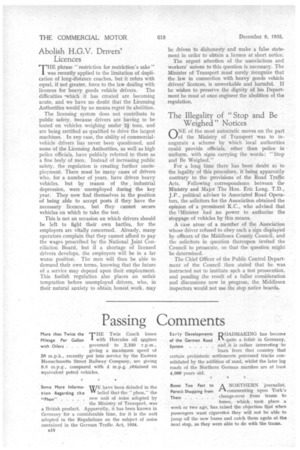Abolish H.G.V. Drivers' Licences
Page 32

If you've noticed an error in this article please click here to report it so we can fix it.
THE phrase " restriction for restriction's sake" was recently applied to the limitation of duplication of long-distance coaches, but it refers with equal, if not greater, force to the law dealing with licences for heavy goods vehicle drivers. The difficulties -.which it has created are becoming acute, and we have no doubt that the Licensing Authorities would by no means regret its abolition.
The licensing system does not contribute to public safety, because drivers are having to be tested on vehicles weighing under 2Atons, and are being certified as qualified to drive the largest machines. In any case, the ability of commercialvehicle drivers has never been questioned, and some of the Licensing Authorities, as well as high police officials, have publicly referred to them as a fine body of men. Instead of increasing public safety, the regulation is creating further unemployment. There must be many cases of drivers who, for a number of years, have driven heavy vehicles, hut by reason of the industrial depression, were unemployed during the key year. They now find themselves in the position of being able to accept posts if they have the necessary licences, but they cannot secure vehicles on which to take the test.
This is not an occasion on which drivers should be left to fight their own battles, for the employers are vitally concerned. Already, many operators complain that they cannot afford to pay the wages prescribed by the National Joint Conciliation Board, but if a shortage of licensed drivers develops, the employers will be in a far worse position. The men will then be able to demand their own terms, knowing that the future of a service may depend upon their employment. This foolish regulation also places an unfait temptation before unemployed drivers, who, in their natural anxiety to obtain, honest work, may be driven to dishonesty and make a false statement in order to obtain a licence at short notice.
The urgent attention of the associations and workers' unions to this question is necessary. The Minister of Transport must surely recognize that the law in connection with heavy goods vehicle drivers' licences, is unworkable and harmful. If he wishes to preserve the dignity of his Department he must at once engineer the abolition of the regulation.




























































































